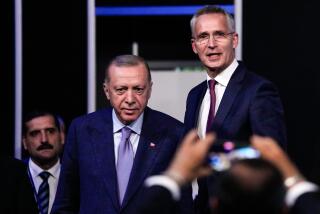Kurds Pose a Moment of Truth for Turkey, U.S.
- Share via
Unresolved tensions between Turkey and the Iraqi Kurds are forcing Washington to choose sides between our vital strategic ally in Ankara and our long-standing moral obligation to protect Iraq’s Kurds. Beneath this dispute lies a much more fateful question: What kind of rights should ethnic minorities enjoy in the modern world?
On the one hand, the Iraqi Kurds were corralled by the British into the new state of Iraq after World War I, separated from their Kurdish brethren in Turkey, Syria and Iran. They are fed up with brutal rule from Baghdad and would like to be independent, although they recognize that’s probably not realistic at this juncture.
On the other hand, there’s Turkey, which, despite its extraordinary odyssey toward becoming a modern, Westernized and democratic state, still reverts to old anxieties and fears as it looks south at this part of Iraq, once part of its empire.
Turkey has its own Kurds, who make up 20% of the Turkish population and who yearn for recognition of their existence and cultural rights and for some degree of autonomy over their local affairs. Yet many Turks -- including parts of the security establishment and members of nationalist groups -- believe that any such concessions would lead down a slippery slope to the division of Turkey.
In dealing with its own Kurds, Turkey has operated from the start on the 19th century notion that “nation-states” must ensure national homogeneity by imposing nationwide assimilation. The state ignored and even denied the existence of the Turkish Kurds and banned them from public use of their native language or traditional clothes in an effort to create a “purely Turkish” state.
The Turks even fought a bloody counterinsurgency war against Kurdish separatist rebels that started in 1984; they largely defeated the rebels, but the Kurdish region was left smoldering.
Today, as Ankara looks across the border into Iraq, it sees another group of Kurds making a bid to entrench Kurdish autonomy in a new Iraqi constitution and poised to take over Kirkuk’s oil wealth to fund Kurdish nationalist ambitions. This echoes ominously across Turkey.
Turks have historical memories of Europeans inciting ethnic rebellions within the multiethnic Ottoman Empire. Some fear Washington is now “punishing” Turkey for denying military bases to the U.S. during the war by letting the Iraqi Kurds have their way.
Rather than let this happen, Turkey has massed thousands of troops on the Iraqi border, threatening to march in if its interests are jeopardized.
But the Turks’ fear about their Kurdish population is largely misplaced and betrays a deep lack of self-confidence. In reality, Turkey’s Kurds seek only recognition of their existence as a people and some cultural, linguistic and local administrative rights. To give Turkey credit, in the last decade it has made some modest progress toward recognizing some of these aspirations as it works toward European Union membership.
The Ankara government now faces a moment of truth.
Ironically, if it were to choose this moment to expand the rights of its own Kurds, that would actually leave it largely impervious to what happens in Iraq. It is only the Turks’ failure to meet the cultural needs of their own Kurds that renders them vulnerable to events in northern Iraq and constantly open to manipulation by Turkey’s regional opponents.
The emergence of Kurdish authority in Iraq, and even control of Kirkuk, however politically sensitive, is a fait accompli. As much as Turkey would love to roll back the clock to 1991 in northern Iraq, Turkey’s strength will lie in working with the realities of the new Iraq and not against it.
The U.S. and Turkey are now actually dealing with more of the unfinished business of the colonial legacy of the Middle East. Will Iraqi Kurds accept the British-imposed forced marriage with the Arab region to the south? Can Iraq ever function comfortably as a modern, multiethnic and multi-religious state without another Saddam Hussein to enforce it?
These are the grand questions that Washington has inherited.
More to Read
Sign up for Essential California
The most important California stories and recommendations in your inbox every morning.
You may occasionally receive promotional content from the Los Angeles Times.













